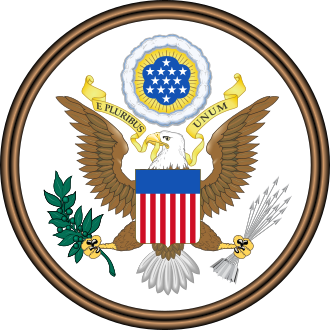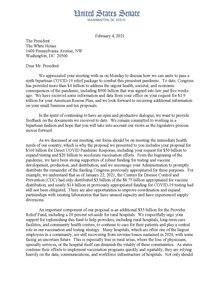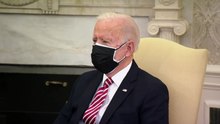The American Rescue Plan Act of 2021 is a $1.9 trillion economic stimulus package proposed by President Joe Biden to speed up the United States' recovery from the economic and health effects of the COVID-19 pandemic and the ongoing recession. He plans to pass this as one of his first bills into law through the 117th Congress.[2] First proposed on January 14, 2021, the package builds upon many of the measures in the CARES Act from March and in the Consolidated Appropriations Act, 2021 from December.[3][4]
Beginning on February 2, 2021, Democrats in the United States Senate started to open debates on a budget resolution that would allow them to pass the stimulus package without support from Republicans through the process of reconciliation. The Senate voted 50-49 to approve the resolution, and the House voted 218-212 to approve the resolution. A vote-a-rama session started two days later after the resolution was approved, and the Senate introduced amendments in the relief package. The day after, Vice President Kamala Harris casted her first tie-breaking vote as Vice President in order to give the Senate final approval to start the reconciliation process, with the House following suit by voting 219-209.
On February 8, 2021, the Financial Services and Education and Labor released a draft of $1.9 trillion stimulus legislation. A portion of the relief package was approved by the House Ways and Means on February 11, setting it up for a vote in the House. The legislation was also approved by the Transportation and Infrastructure, Small Business, and House Veterans Affairs committees.
Background
Impact of the COVID-19 pandemic
The United States went under an economic recession, and roughly 400,000 Americans died due to the public health crisis.[5][6] Additionally, over 27 million Americans tested positive for COVID-19 since the start of the pandemic.[7] The United States also faced a eviction, unemployment, and hunger crisis since the start of the pandemic.[8] Over 30 to 40 million Americans faced a risk of being evicted from their homes by January 2021.[9] Then-President Donald Trump also faced criticism for not having a federal strategy to combat the pandemic such as nationwide mask mandates on transportation, a testing strategy, health guidelines, providing medical-grade protective gear, and having a effective vaccine distribution strategy. On January 21, the day after Joe Biden was inaugurated, he warned that the death toll could exceed past 500,000.[10] However, according to Snopes, Biden inherited a vaccine distribution strategy from Trump, and disease expert Anthony Fauci said that his administration would incorporate some aspects of that Trump-era strategy in its ongoing work.[11]
Previous COVID-19 pandemic legislation
Prior to the American Rescue Plan, the CARES Act from March and in the Consolidated Appropriations Act, 2021 from December were both signed into law by then-President Donald Trump. Trump previously expressed support for a direct payments of $2,000 along with Joe Biden and the Democrats. Even though Trump called for congress to pass a bill increasing the direct payments from $600 to $2,000, then-Senate Majority Leader Mitch McConnell blocked the bill.[12] Prior to the Georgia Senate runoffs, Biden said that the direct payments of $2,000 would be passed if Jon Ossoff and Raphael Warnock won their seats, but also warned that it wouldn't pass if either Kelly Loeffler or David Perdue won.[13] On January 14, prior to being inaugurated as President, Biden announced the $1.9 trillion stimulus package.[14]
Legislative history
Negotiations
Ten Republican senators announced plans to unveil a roughly $600 billion COVID-19 relief package as a counterproposal to President Joe Biden's $1.9 trillion plan meant to force negotiations. The senators, including Susan Collins of Maine, Lisa Murkowski of Alaska, Mitt Romney of Utah and Rob Portman of Ohio, told Biden in a letter that they devised the plan "in the spirit of bipartisanship and unity" that the President has urged and said they planned to release a full proposal on February 1.[15] On the same day, House Speaker Nancy Pelosi and Senate Majority Leader Chuck Schumer introduced a budget resolution co-sponsored by Bernie Sanders as a step to pass the legislation without support from the Republican Party.[16] The next day, Biden met with Majority Leader Schumer and other Democrats regarding the relief package.[17]
On February 7, Transportation Secretary Pete Buttigieg and Treasury Secretary Janet Yellen expressed support for the stimulus package. Yellen said that the funding would help millions of Americans and rejected concerns the colossal spending could cause inflation.[18] Yellen also said that the stimulus package would restore full employment by 2022.[19] On February 9, Biden met with JPMorgan Chase CEO Jamie Dimon and other CEOS to discuss the stimulus plan, with Yellen and Harris taking part in the meeting.[20][21] On February 11, Pelosi said that she expects lawmakers to complete the legislation by the end of February, and for the legislation to be signed into law by March 14.[22]
On February 16, Biden promoted his stimulus plan in a visit in Milwaukee, Wisconsin during his first official trip as President. He promoted it via a CNN townhall meeting with voters.[23] On February 18, Yellen called for major stimulus checks during a interview on the CNBC, and said that stimulus checks would help the economy stage a full recovery.[24]
Budget resolution passage
The United States Senate voted 50–49 to open debate on the resolution, which would allow Democrats to pass the relief package without support from Republicans through the process of reconciliation.[25][26] The House voted 218–212 to approve the budget resolution.[27] On February 4, a vote-a-rama session began, and the Senate introduced amendments to the relief package, including a amendment in a 90–10 vote that would provide direct relief to the restaurant industry.[28][29] Vice President Kamala Harris casted her first tie-breaking vote as Vice President to give final Senate approval to the reconciliation bill, sending it to the House to approve the changes, and allowing drafting of the relief bill to begin in the committees.[30] The House approved the resolution 219–209, with Jared Golden being the sole Democrat to join all Republicans in opposition to the bill due to a preference for a separate vaccine bill instead of the longer reconciliation process.[31]
One of the many non-binding budget amendments in the vote-a-rama session was meant to prohibit people who are in the country illegally from receiving pandemic relief checks. The non-binding amendments are not likely to have any effect on the final relief bill. The minority party uses the hundreds of non-binding votes in the hours-long vote-a-rama session to send messages. Under current law, people in the country illegally are already prohibited from receiving checks. The amendment passed with eight Democrats joining all Republicans.[32] The amendment received criticism from progressive immigration activist Greisa Martínez Rosas and Senator Mazie Hirono (D-HI).[33] The White House later stated that it would continue to support legislation that would give all otherwise eligible individuals with social security numbers stimulus checks.[34]
Budget reconciliation passage
President Biden expressed doubt that his push to increase the federal minimum wage to $15 an hour would be included in the final coronavirus relief package.[35][36] Biden predicted that Senate rules for budget reconciliation would prevent the increase from going forward. Sanders and his allies argued that the higher wage would reduce the amount of federal assistance low-income individuals receive and increase their taxable income — meeting the Senate parliamentarian’s requirement that any reconciliation measure have an effect on the federal budget. Democrats like Sen. Joe Manchin (D-W.V.) and Kyrsten Sinema (D-AZ), who opposes raising the minimum wage to $15, could resist the measure.[36] In contrast to Sinema, Mark Kelly (D-AZ) expressed support for increasing the minimum wage to $15.[37] Additionally, 67% of Americans support increasing the minimum wage to $15 an hour.[38]
On February 8, a draft of the $1.9 trillion stimulus legislation was released by the Financial Services and Education and Labor committees.[39] On February 11, the House Ways and Means Committee advanced a portion of the $1.9 trillion relief package.[40] The legislation was also approved by several other House committees such as the Transportation and Infrastructure, Small Business, and House Veterans Affairs.[41] On February 18, Pelosi said that the House will vote on the stimulus package by next week.[42] On February 19, Schumer predicted that the Senate will pass the bill before March 14.[43]
On February 19, the full text of the bill was released. It included an increase in the federal minimum wage, direct checks for Americans making $75,000 or less a year, an extension of $400 federal unemployment benefits and more money for small businesses.[44] The House Budget Committee will vote on the bill on February 22, where it will then have a vote on the House floor.[45]
Provisions
The New York Times reported that key elements of the plan include:
- Extending expanded unemployment benefits with a $400 weekly supplement through end of September (vs. March 31 currently)
- $1,400 direct payments to individuals
- $20 billion for a national vaccine program, including preparation of community vaccination centers
- Funding for 100,000 public health workers for vaccination outreach and contact tracing
- Funding to help address disproportionate impact on people of color, for community health centers, prisons, and jails
- Emergency paid leave for over 100 million Americans
- Tax credits for families to offset up to $8,000 in annual child care costs
- Aid to renters with unpaid debts to landlords
- Grants to small businesses
- Funds to accelerate vaccine deployment and to safely reopen most schools within 100 days
- $350 billion to help state and local governments bridge budget shortfalls.[4]
On February 8, 2021, Senior House Democrats unveiled legislation that will provide $3,000 per child to tens of millions of American families and $250 per month to millions as part of the relief package. The bill will also allow the Internal Revenue Service to provide $3,600 over the course year for children under 6. The size of the benefit would diminish for Americans earning more than $75,000 per year. The proposal was backed by Senator Mitt Romney of Utah, who introduced a similar bill four days earlier.[46]
Impact
Budgetary impact
On February 8, the Congressional Budget Office said that increasing the minimum wage to $15 would lift 900,000 people out of poverty, but also warned that it could increase the deficit to $54 billion and reduce the employment rate by 1.4 million jobs over four years.[47] In regards to the wage, the CBO study stated that it would cumulative raise the wage of all affected people by $333 billion. Interest costs would add another $16 billion to the deficit.[48] On February 11, the CBO projected that the deficit would be $2.3 trillion deficit before the stimulus plan is passed into law, down from $900 billion last year.[49] Despite the report from the CBO regarding concerns about increasing the minimum wage to $15, the Democrats will move forward doing so.[39] On February 16, 2021, GOP Senators Romney and Tom Cotton (R-AR) announced that they will work on a separate bill that would increase the minimum wage, but would also prohibit businesses from hiring undocumented immigrants.”[50]
Economic impact
In a letter obtained by the Albany Times-Union, Speaker Pelosi told New York congressional democrats that the state would receive $50 billion in funding as part of the stimulus bill. In the letter, she also contradicted claims made by Governor Andrew Cuomo that the bill didn't receive enough federal government funding.[51] The stimulus bill would boost the income of poor Americans by nearly $4,000.[52] The bill could send $3.9 billion to Nevada, which would fulfill pleas made from Governor Steve Sisolak.[53] Senator Richard Blumenthal said that the stimulus plan would help struggling businesses in Connecticut survive, as well as providing $78 million to Bridgeport.[54]
Political reactions
Biden’s relief package faced criticism from progressive and Republican lawmakers. Rep. Kevin Brady (R-TX) criticized his plan as “not saving Main Street”.[55] Senator Roger Wicker (R-MS) criticized Biden’s plan as premature and said that it contains “wasteful priorities that do not address the nation’s most pressing needs”.[56] Democratic Representatives Alexandria Ocasio-Cortez (D-NY) and Cori Bush (D-MO) criticized his plan for not fulfilling his campaign promise to provide $2,000 to Americans. Steve Scalise called the bill "Payoff to Progressives Act." when the text was released on February 19, and urged his colleagues in an email to vote 'no'.[45]
Schumer and Pelosi praised Biden's plan and stated that they would get Biden’s proposal passed. Biden also said that he would “finish the job of getting a total of $2,000 in cash relief to people who need it the most”.[57] Republican Mayors such as Jerry Dyer of Fresno, Francis X. Suarez of Miami, David Holt of Oklahoma City, and Betsy Price of Fort Worth, Texas expressed their support for the plan. Dyer told the Washington Post that "It’s not a Republican issue or a Democrat issue. It’s a public health issue. It’s an economic issue. And it’s a public safety issue".[58] In a February 11 poll from Newsweek, over 60% of Republican voters expressed support for the stimulus plan, and a poll from Quinnipiac University finds that 68% of Americans support it.[59][60]
President Biden
President Joe Biden advocated for fast-tracking the stimulus package with optimally bipartisan support. In remarks issued on February 5, Biden criticized the GOP for what he described as a lack of will amongst the GOP to seek a bipartisan compromise on a final aid bill, arguing that the GOP is engaging in willful obstruction of his proposal.[61] At the time, Biden signaled openness to passing the legislation without any support from congressional Republicans.[62] Biden stated that he could not, "in good conscience," make concessions to Republicans who he said propose to either "do nothing or not enough" as Republicans complain Biden is forsaking his promises on bipartisanship and unity.[61] Furthermore, Biden noted that "[a]ll of a sudden, many of them have rediscovered fiscal restraint and the concern for the deficits" whereas in the Trump administration Republicans had passed trillions in dollars in tax cuts and mostly corporate aid for the coronavirus crisis, adding trillions of dollars to the national debt without much reservation.[61]






No comments:
Post a Comment